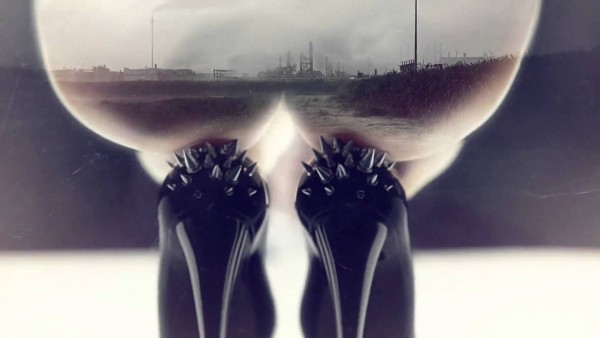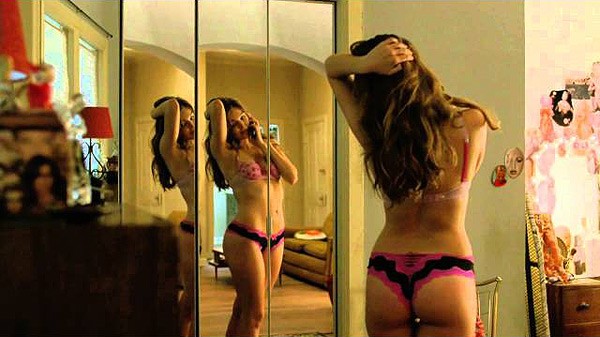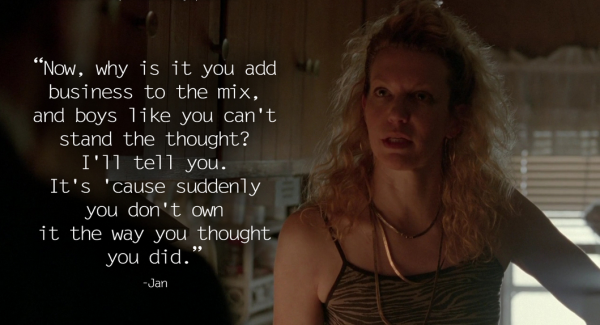
One of my partners cautioned me that I might take issue with the treatment of sex workers in season one of True Detective. Yet somehow, I completely forgot their warning, and found myself marathoning it over a few days several months ago. The first season is a continual whorephobic, misogynistic trainwreck, so it’s difficult for me to pinpoint why I liked it so much—aside from the frequent views of Matthew McConaughey’s stunning physique, of course.
To say that True Detective is masterfully produced is an understatement. A Southern noir set in Louisiana, it’s the story of a murder investigation spanning 17 years between 1995 and 2012. With lush cinematography, careful direction, and well-rounded, complex characters, it is a tight and compelling show. The acting is superb, especially Matthew McConaughey’s performance as dysfunctional, misanthropic detective Rust Cohle.
Where True Detective falls flat is in its writing and storyline, which both rely heavily on classic serial killer, police procedural, and anti-hero tropes. The fact that sex workers are going to be used as props for the story, rather than the well-rounded, complex characters they deserve to be, is apparent from the opening credits. We see a bare female ass and a pair of spiky high heel shoes, a stripper shimmying in slow-motion in a patriotic one-piece, a heavily made-up eye fading into a line of trucks at a truck stop. The mournful country ballad playing over these images is mesmerizing, but adds an unmistakable foreboding tone of violence over these sexualized representations of femininity.
The show’s creator, Nic Pizzolatto, stated that he did not want True Detective to be “just another serial killer show.” Here’s what I want to know: if your intent is for your serial killer show to not be just another serial killer show, why make it about the serial killing of sex workers, an overused trope if there ever was one? The victim of the ritualistic, apparently occult murder that Cohle and his partner Marty Hart (Woody Harrelson) are investigating in 1995 is named Dora Lange (Amanda Rose Batz). We don’t learn her name until about mid-way through the first episode, but we learn that Cohle suspects she is a sex worker—or a “prost,” as he calls them—when he tells Hart that the victim has herpes sores around her mouth and bad teeth. Unfortunately, I suspect that this is probably an accurate portrayal of how detectives attempt to identify a murdered sex worker, both in 1995 and 20 years later in 2015.
It was a huge disappointment, though not a shock, to discover that Cohle’s suspicions about Lange are spot on. He rubs salt in the wound when he states he’s going to investigate a local “prost farm” to see if he can discover her identity. The “prost farm” ends up being a truck stop where he interviews two sex workers who are not nearly as leery of him as they should be. He behaves in a threatening manner toward them from the very start, but instead of running for the hills, they both give him the information he’s looking for, as one obviously does any time a police officer comes sniffing around without a warrant. In a scene that is meant to develop Cohle as a character with drug dependency issues, sex workers are further stereotyped when he asks one of them if she can get him some quaaludes. Remember, this is 1995—quaaludes weren’t even a thing at that point, having been off the market since 1984. Any self-respecting drug dealing sex worker would have laughed in his face. But she states instead that they “could be hard to get,” then ultimately produces them. The scene reaffirms the idea of sex workers as all purpose drug dispensing machines for middle class white men on benders.

Despite Cohle’s ridiculous behavior around sex workers in this first episode, his character is ultimately the saving grace of the series. Cohle is no hero, and perhaps treads far beyond even anti-hero territory in his treatment of women throughout the show. However, Cohle looks like a saint in comparison to his partner, whose treatment of sex workers, not to mention his wife and daughters, is abysmal. Cohle’s nihilistic musings are likely the most fascinating material in the show. And he has good reason to be such a “realist,” as he calls himself: after his young daughter was killed in an auto accident, his marriage fell apart and he joined some sort of deep undercover LSD drug enforcement operation (you have to assume it’s LSD because he has classic “acid flashbacks”), at which point he developed his drug and alcohol dependency issues. Of course, the idea of there being a deep undercover LSD drug enforcement operation is ridiculous, as is the fact that Cohle still experiences periodic hallucinations years after mostly kicking his habits, as acid flashbacks themselves are an urban myth.
Still, Cohle’s reactions to the world he lives in are the only reactions that it makes sense for him to have. Much of the dialogue of the series revolves around Hart being disturbed by his partner’s bleak, defeatist statements, telling him that people in this part of the world don’t think that way and don’t want to hear that kind of shit. But one has to wonder why Hart doesn’t have the same reaction to the world, after witnessing the scene of Lange’s brutal murder.
There is one bright spot regarding sex work in this series, and it comes in episode two when Hart and Cohle follow leads on Dora Lange to a trailer park locally known to be a “bunny ranch.” The trailer park is a clichéd, lower class sort of brothel, what some might consider the worst nightmare of a situation for sex workers, but it seemed like a pretty awesome set-up to me. The very fact that this place exists, and is under the protection of the local sheriff, seems improbable to me; but then again, I don’t know how sex work was done in 1995 Louisiana, and the noir genre isn’t exactly known for its realism.
Their suspicions that Dora Lange lived and worked there turn out to be correct, and they interview a young sex worker named Beth (Lili Simmons), who was friends with Dora. After the interview, Hart confronts the brothel’s madam, Jan (Andrea Frankle), stating that Beth appears to be underage. Hart and Jan go around about it a bit, with Hart doing some typical mansplaining about what a travesty it is and Jan informing Hart that Beth had to run away from a “bad situation” (implied to be sexually abusive, another sex worker stereotype) involving her uncle. Eventually, Jan comes out with this powerful statement:
Girls walk this Earth all the time screwin’ for free. Now, why is it you add business to the mix and boys like you can’t stand the thought? I’ll tell you. It’s ‘cause suddenly you don’t own it the way you thought you did.
Maniacal laughter burst forth from me unbidden when I watched this scene, but at the same time it felt a little hollow. I got my hopes up that this would be the turning point in the series; the point where the show stopped following the standard sex worker tragedy porn narrative. But I didn’t get my hopes up too high, and that was a good thing. Sex workers and their words begin to drop out of the story altogether after this episode, with Beth’s brief reappearance in 2002 being one of the few other plot points dedicated to a sex worker who isn’t dead.
Through a series of flashbacks to 1995, as told through interviews with Cohle and Hart in 2012, we eventually learn how the Dora Lange murder was solved, and watch as her killer is murdered by Hart in a fit of rage when he finds two children on the killer’s property, one dead and the other on the brink of death. Cohle manages to plan a decent cover-up, and Cohle and Hart go down in history as heroes who survived a fire fight with a meth-addled serial killer.
After a near separation with his wife upon the discovery of his extramarital affair, Hart ostensibly lives happily ever after, at least until 2002. Cohle, on the other hand, disappears after he quits the force in 2002, following a mysterious conflict between him and Hart. When we see him being interviewed in 2012, he is a different man; time has been rough on him, or at least so the production team wants us to believe after placing a shaggy wig atop McConaughey’s head and either adding or subtracting a bit of make-up to age him. He is also a functional alcoholic, admitting in his interview that he starts drinking around noon on his days off. Even when it comes to the male protagonists of True Detective, drugs and alcohol are used as convenient and nuanceless plot devices to demonstrate psychological deterioration. There is very little exploration of what actually led to this deterioration, but plenty of implication that the characters are weak-willed and pitiful because of their relationships with drugs and alcohol.
In episode six, we finally learn what happened between Hart and Cohle in 2002, and you guessed it: Former underage sex worker Beth reappears, and becomes the catalyst that finally ends Hart’s marriage. In a move that can only be described as bewildering, a now legitimately employed and legally aged Beth runs into Hart in a bar and proceeds to seduce him. Is it hero worship that causes her to decide to seduce an unattractive (sorry Woody Harrelson, but you’re no Matthew McConaughey), married man twice her age with no redeeming qualities? We may never know. Around the same time, Hart’s 16-year-old daughter, Audrey, is caught in the back seat of a car having a threeway with a couple of scummy older boys. Hart slaps her during the argument that ensues between Audrey, Maggie and himself, calling her a “whore.” Their relationship never recovers, and neither does his relationship with his wife. It was clearly the show’s intent to point out Hart’s hypocrisy in having these two events coincide, but no attempt is ever made to humanize his daughter’s choice, or to respect her sexual autonomy. Rather, we see Hart take his anger out on the boys with whom she was caught, beating them both bloody. He pukes afterwards, but is it out of remorse for what he has done? Or out of fear of what his daughter may become?

Eventually we discover the reasons behind the conflict between Hart and Cohle that caused Cohle to quit the force and disappear: when Maggie discovered that Hart was cheating on her with Beth, she in turn cheated on Hart with Cohle in a scene that I could write another article about. Needless to say, it only serves to reinforce female sexuality as a negative and ugly influence on the lives of our male protagonists. Ten years pass and Cohle and Hart reunite to solve the larger conspiracy behind Lange’s murder. Cohle shares his theories about the case with Hart; that the man they shot for murdering Dora Lange was part of a larger group of occult murder fanatics with a leader known as “the Yellow King.” Hart makes some amazing leaps in logic regarding a police sketch of a green-eared “spaghetti monster” who chased a young girl through the woods, and they end up finding a Faulknerian Southern cliche of a serial killer living with his mentally disabled half-sister (whom he’s sexually abusing, of course) and his father’s corpse in a house straight out of Hoarders. This character is a little too convenient—he is a straw man, truly evil without complexity.
Take it from this sex worker, Nic Pizzolato: you failed epically in your attempt to make your serial killer show unlike other serial killer shows. From the stale usage of sex workers as victims in need of rescuing, to the rampant misogyny and (female) victim-blaming, to the idea of a murder cult which preys on sex workers and children, to the completely disturbing and destitute life of the murder cult leader, True Detective does very little to differentiate itself. So, why has it left such an impression on me?
Sometimes, a piece of media can be so well put together that we tend to forgive or forget its problematic elements. Other times, there are so many problematic elements that it becomes an easy target for criticism, and it’s enjoyable to watch precisely because you can groan and roll your eyes at it. True Detective has both of these phenomena happening, which is probably why I feel so confused about it. I would find myself laughing at how ridiculous it was while simultaneously being so engaged that I would forget the silliness in favor of moving on to whatever exciting, dramatic scenario was up next.
But I absolutely believe that Hollywood needs to hold itself to better standards when it comes to sex workers (and hey, Hollywood script writers: I am available to consult on your scripts for a small fee!). Shows like True Detective are doing nothing to advance the rights of sex workers; they are only perpetuating the stigma that continues to make our oppression possible. But media that is harmful to sex workers also gives us a chance to have a conversation about what exactly is wrong with these tropes. I feel less guilty for enjoying True Detective when I think I can make a positive impact by sharing my thoughts on it.

kitten karlyle this was a really wonderful and nuanced analysis of a show I found both disturbing and fascinating. You nailed it though and yet the problem remains can a male screenwriter ever truly capture profoundly female experiences. Yes of course there are cis men and trans women whose experiences exist and need to be told too. But as a woman watching the representation of my many experiences I am constantly amazed (and underwhelmed) at how fantastically wrong many writers get it. Bravo to you. I would love to see you publish this in a film journal.
” if your intent is for your serial killer show to not be just another serial killer show, why make it about the serial killing of sex workers, an overused trope if there ever was one? ”
A show that features a murdered sex worker isn’t the same thing as a show “about the serial killing of sex workers.” I think it’s obvious that the show is NOT about the serial killing of sex workers.
Yes, the two main characters (and many non-main characters) are shitty human beings, Hart being the worst of the two imo. Real life is also full of shitty human beings. I honestly don’t understand why people are so shocked to also see them on television.
There’s a LOT I liked about the show, personally.
Loved this. I donated. I’d LOVE to read Kitten’s take on that scene between Cohle and Maggie. I try to make sense of my reaction to it, and my husband’s.